Aaron Roth – HOPE International – “What I Gave Up” – March 2012
- Download this email as a pdf: Aaron Roth – March 2012 Update.pdf
- Blog and Support Page: www.AaronRoth.net
- HOPE International Worldwide – www.HOPEinternational.org
- Newsletter Archive: AaronRoth.net – Monthly Newsletters
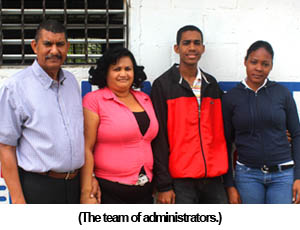
I do miss home from time to time. I think about the friends I used to hang out with, the foods I used to eat, driving my car around with the windows down and the AC on, and mainly just being comfortable having a full-time paying job. I suppose I could make that list go on and on, and like any volunteer overseas, I sometimes marvel at the smallness of my room, the few possessions I have, and say to myself, “Wow I’ve given up a lot to be here.”
I met an Angel when I was working in Los Alcarrizos, Santo Domingo a week and a half ago. Yes, it’s capitalized and it’s a proper name because he’s pictured here, standing on the left. I could have easily started a paragraph with “I’ve talked with Jesus just about everywhere in this country,” and that’s also true on a few levels. 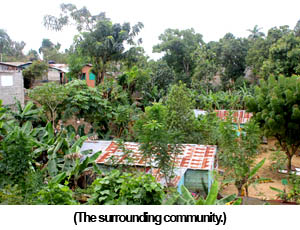 Anyway, Angel is a pastor, a father of three, and a mainstay at the school “Colegio Lubrera de Caballona” for the past three years with his team of dedicated teachers and administrators.
Anyway, Angel is a pastor, a father of three, and a mainstay at the school “Colegio Lubrera de Caballona” for the past three years with his team of dedicated teachers and administrators.
Angel has over 25 years of experience running logistics and managing operations for other not-for-profit organizations in this country, but he’s here at this school working with about 50 students that didn’t fit in at other schools. For reasons like lack of discipline or learning disabilities their parents have sent their children here. Angel tells me, “When you see the necessity of the community, how can you not be involved?”
Standing next to Angel is Lucila, she’s the director of the school, and she’s got an equally impressive professional track record. In some ways, she doesn’t “need to be here” either and certainly she could 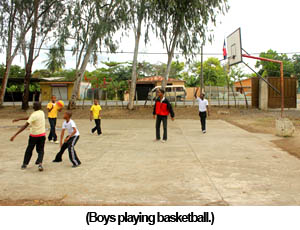 make a lot more money working at another school. Surely, there’d be better benefits, insurance, and opportunities for an annual salary raise. But “It’s worth it,” she tells me “because we have the ability to transform these children by helping them to learn, to grow, and to prepare them for the future.”
make a lot more money working at another school. Surely, there’d be better benefits, insurance, and opportunities for an annual salary raise. But “It’s worth it,” she tells me “because we have the ability to transform these children by helping them to learn, to grow, and to prepare them for the future.”
I look over and Chanel is playing basketball with the boys. He’s 19, well-spoken, full of energy, and is currently disciplining a young man who is not playing fairly. “We enforce the discipline here because we love them, and I know that to them, that’s a strange concept, but without rules they don’t grow, they’ll never make the right decisions.” I wonder why Chanel (yes, it’s the same name of the perfume) is spending his time here. He’s got just about every option available to him right now in his life. But he’s here, present with the children, teaching them about life when it seems it’s just about basketball.
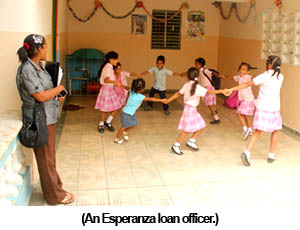 I’ve met a few of our Esperanza loan officers over the past year that have told me they’ve turned down better paying jobs because they feel called to be here, working in these communities, being a part of someone’s life, sharing from the Bible, assisting with someone’s transformation from economic poverty to self-sustainability and onto profitability. They ask me, “Where else would I have this opportunity?”
I’ve met a few of our Esperanza loan officers over the past year that have told me they’ve turned down better paying jobs because they feel called to be here, working in these communities, being a part of someone’s life, sharing from the Bible, assisting with someone’s transformation from economic poverty to self-sustainability and onto profitability. They ask me, “Where else would I have this opportunity?”
It’s like they’re standing in front of two doors with glass panes. Inside one they see there’s an air conditioner perched above just one large desk, in the corner sits a water cooler with ready plastic  cups, a comfortable chair that adjusts, a nice laptop that was manufactured within the past two years, a bowl of fruit and plenty of natural light streaming in. Looking through the other glass pane, they see the opposite on every level, and it contains three more desks in the same space. Strangely, they choose the latter. Why?
cups, a comfortable chair that adjusts, a nice laptop that was manufactured within the past two years, a bowl of fruit and plenty of natural light streaming in. Looking through the other glass pane, they see the opposite on every level, and it contains three more desks in the same space. Strangely, they choose the latter. Why?
They have all given up a lot to be here. In strictly utilitarian terms, they’ve given up a tremendous amount, and certainly, five or ten times more than I have, and this is the thing that hits me: they’ve given up more than I will ever have to give up.
To pick just one tiny example, the small bathroom that I share with another roommate has hot water. The people I just mentioned, always take cold showers. Always. There is no hot water. They probably will not have hot water anytime soon, or maybe even ever. The building where I live, strangely, has internet. The only way to check email is to walk to a local internet center for most of these people.
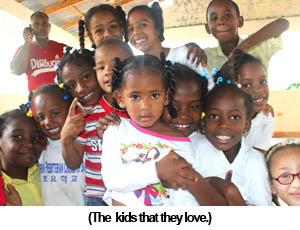 I’d like to think I’m getting more mature, and to that end I’d like to be very clear right now: this is not an opportunity for me nor for you to feel guilty. This is not a game of us and them tallying up our spiritual disciplines or accomplishments, nor of erasing our board completely. I simply want to say that we should all be inspired again by these verses:
I’d like to think I’m getting more mature, and to that end I’d like to be very clear right now: this is not an opportunity for me nor for you to feel guilty. This is not a game of us and them tallying up our spiritual disciplines or accomplishments, nor of erasing our board completely. I simply want to say that we should all be inspired again by these verses:
What I have seen in each one of these people is: they have simply given up a few things to make room for others. I see joy, and patience, and willingness to open their hearts and to really be present with someone and really take the risks to love. I’m a firm believer that we can only carry so much with 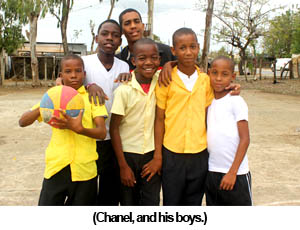 the two hands we’ve been given.
the two hands we’ve been given.
We must always give up to receive. When I take a step back and look at the tremendous amount of blessings, relationships, and joys I have received since I’ve left it’s actually quite clear to me now: I’ve been thinking that this was an unbalanced equation. It is, but I was looking at it from the wrong side. I haven’t given up much at all. No, I’ve been given so much. So much more than I could have ever imagined. As I step back and look at my experience here, I’m speechless.
I pray that God would give us eyes to see what we can give up, and that we would give without expectation, and take joy in what we receive.
Bendiciones,
-Aaron
aroth@hopeinternational.org
(540) 421-8683
Skype: aprothwm05
Web: www.AaronRoth.net



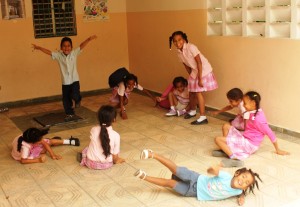

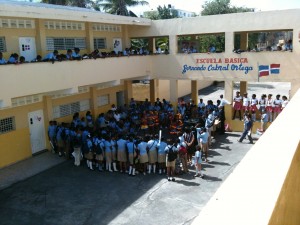

 Newsletter Archive:
Newsletter Archive: 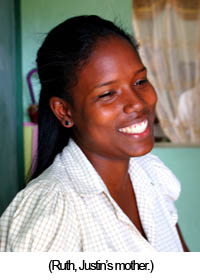 .) So that’s where he gets it from.
.) So that’s where he gets it from.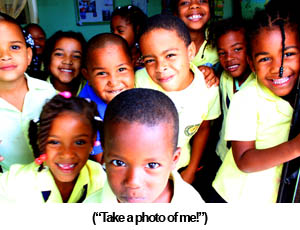 I love it. Working with these schools and their owners to help improve their businesses and their role in the community always brings joy to me. I guess it helps that kids here are like kids everywhere. Full of joy and endless wonder, ready to talk to anybody who walks through the door. At this age, they are full of innocence and possibility.
I love it. Working with these schools and their owners to help improve their businesses and their role in the community always brings joy to me. I guess it helps that kids here are like kids everywhere. Full of joy and endless wonder, ready to talk to anybody who walks through the door. At this age, they are full of innocence and possibility.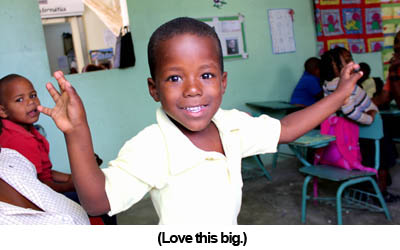
 For spectators and most costumed young men, it’s all for fun, a cultural celebration that they’ve been doing for years and years. Standing there watching the powerful swings of the rope by young, skilled, baseball-obsessed young men, I hear the squeals of girls jumping out of the way, and I’m taken back by one thing: the faces of some of these young men. They aren’t smiling. They aren’t really having a good time, are they? Their eyes don’t show celebration, nor revelry in being part of a parade, but simple determination to strike someone else, someone who may or may not deserve it.
For spectators and most costumed young men, it’s all for fun, a cultural celebration that they’ve been doing for years and years. Standing there watching the powerful swings of the rope by young, skilled, baseball-obsessed young men, I hear the squeals of girls jumping out of the way, and I’m taken back by one thing: the faces of some of these young men. They aren’t smiling. They aren’t really having a good time, are they? Their eyes don’t show celebration, nor revelry in being part of a parade, but simple determination to strike someone else, someone who may or may not deserve it.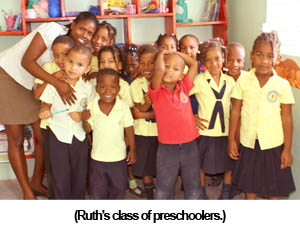 love comes in, no love goes out.
love comes in, no love goes out.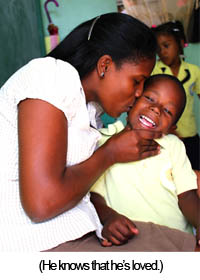 I asked her why she became a teacher here and she responded that 15 years ago she was one of the first students in a class of 50 that the director, Aleyda Torres, taught. What she received as a young girl was a good education, daily encouragement, and above all else, that she was valued and loved. Now, the school cares for over 440 students in the same way in one of the roughest areas of La Romana. Ruth continues:
I asked her why she became a teacher here and she responded that 15 years ago she was one of the first students in a class of 50 that the director, Aleyda Torres, taught. What she received as a young girl was a good education, daily encouragement, and above all else, that she was valued and loved. Now, the school cares for over 440 students in the same way in one of the roughest areas of La Romana. Ruth continues: